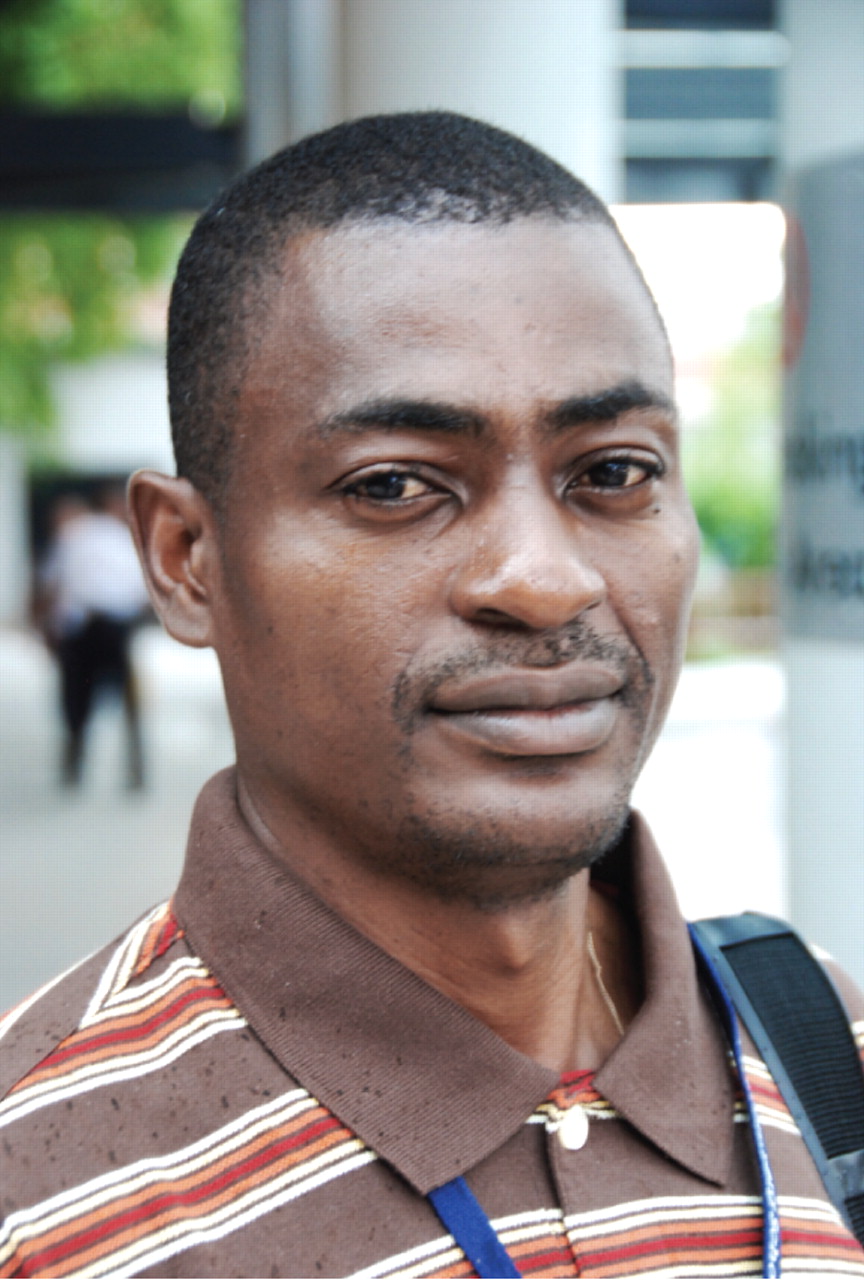Jean-Pierre Kamga Olen, M.D., is a young man with a big mission.
Kamga Olen, 34, has completed years of study in psychiatry and neurology and has begun work on a personal long-term plan to strengthen psychiatry's place in his native Cameroon's medical system.
“That is my fight—to encourage young M.D.s to enter psychiatry,” said Kamga Olen in a recent interview at the Johns Hopkins Bloomberg School of Public Health, where he spent a week studying psychiatric epidemiology and genetics.
There are few psychiatrists in Cameroon, said Kamga Olen. In fact, when he returns from years of advanced training at Cheikh Anta Diop University in Dakar, Senegal, he will be just the third active member of the profession there. Two other psychiatrists are retired, and another has shifted his focus to national mental health policy, he said. Five other Cameroonian psychiatrists have gone to France to train and have remained there, a manifestation of the brain drain that affects so many developing countries.
Kamga Olen is particularly interested in exploring the boundaries between conventional Western psychiatry and local African cultural patterns. For instance, during the rainy season in some parts of West Africa, heat and humidity may make people lethargic, he said. In the dry season, they become more active. Those climatic variations can make it hard to distinguish seasonal behavioral changes from bipolar disorder without an understanding of the setting in which the disorder occurs, he said.
Also, psychotic delusions often take on persecutive, religious, and mystical overtones in Africa, said Kamga Olen. Mood disorders may present with somatic symptoms, such as pain, anorexia, or insomnia, rather than the classic symptoms more common in the West.
He hopes to carry out research in Cameroon that will allow him to adapt accepted psychiatric measurement scales—such as the Beck, MMSE, or CIDI—for use with local populations.
That will be no simple task, said psychiatric epidemiologist Judith Bass, Ph.D., M.P.H., an assistant professor in the Department of Mental Health at Johns Hopkins Bloomberg School of Public Health, who consulted with Kamga Olen when he was in Baltimore.
“Symptoms of depression or anxiety may be universal in some ways, but there are salient local variations and triggers too,” Bass told Psychiatric News. Treatment strategies, whether psychotherapy or medications, must also be adjusted to local conditions, she said.
English Fluency Crucial
Cameroon is a nation of about 19 million people nestled on the coast of West Africa, just southeast of Nigeria. The country includes 200 ethnic groups in eight French-speaking provinces and two Anglophone provinces, legacies of the colonial period that ended in 1960. The country is officially bilingual. Kamga Olen's mother tongue is Féfé, spoken around his hometown of Bafang. His second language is French, and he is working hard to improve his English proficiency. Becoming f luent in English means more than just adding another line to his resumé. He hopes it also will open the wider world of research published in English to him and his colleagues.
Kamga Olen's father was a nurse and his mother a schoolteacher and later a headmistress. His siblings include another physician, a pharmacist, an engineer, and a professional soccer player.
He completed seven years of medical studies in 2000 at the University of Yaoundé I, in Cameroon's capital. Kamga Olen chose psychiatry as his specialty in his sixth year in medical school. He spent four months in the English-speaking town of Atchatougie, near the Nigerian border.
“The hospital took in 100 patients a day, and the medical officer in charge gave me a lot of responsibility,” he said. “I lived in the hospital and did everything—general medicine, obstetrics and gynecology, general surgery.”
Among his patients were several with psychosis or cocaine addiction.
Doctors Know Little Psychiatry
“I found it difficult to help them,” he said. “The psychiatric training in medical school was limited, and I felt frustrated that I knew so little when I encountered these patients.”
When agitated patients arrived in the hospital, the other doctors didn't know what to do with them and simply wrote prescriptions for diazepam. The only real recourse was sending them to psychiatric facilities in Yaounde or Douala, both 500 kilometers away.
“So I knew something had to be done,” he said. Doing something would take time, however.
After graduating, he spent a year as an internist and emergency physician in the university's teaching hospital before taking a post as district medical officer in the town of Djoum.
In 2002 he requested a grant from the Cameroonian government to train in Senegal because there was no place in Cameroon to train psychiatrists. After completing that residency, he received a second grant to study for a Ph.D. in neurophysiology, concentrating in epilepsy. A former middle-distance runner, Kamga Olen retains an interest in the psychological side of sports and is president of the Cameroon Wrestling Association's medical commission.
He's on Recruiting Mission
Kamga Olen is already working to swell the miniscule ranks of psychiatrists in his home country.
“Alone I can do nothing, so I have been encouraging young medical students to join me,” he said. “Three recent graduates have already come to Dakar for their psychiatry residencies. I am also trying to convince the Ministry of Health to organize conferences to attract students to the field of psychiatry.”
(American Psychiatric Publishing Inc. has contributed eight recent books to serve as the core of a library for these young psychiatrists in training.)
He also completed a master's degree in mental health law while in Senegal.
His first priority when he returns home at the end of the year will be to take a post at the Ministry of Health and validate the country's draft mental health law by comparing it with similar laws in France, the United Kingdom, and the United States.
“Cameroon needs a mental health law to protect the rights of mental health patients and define what the state needs to do for them,” he said. ▪

